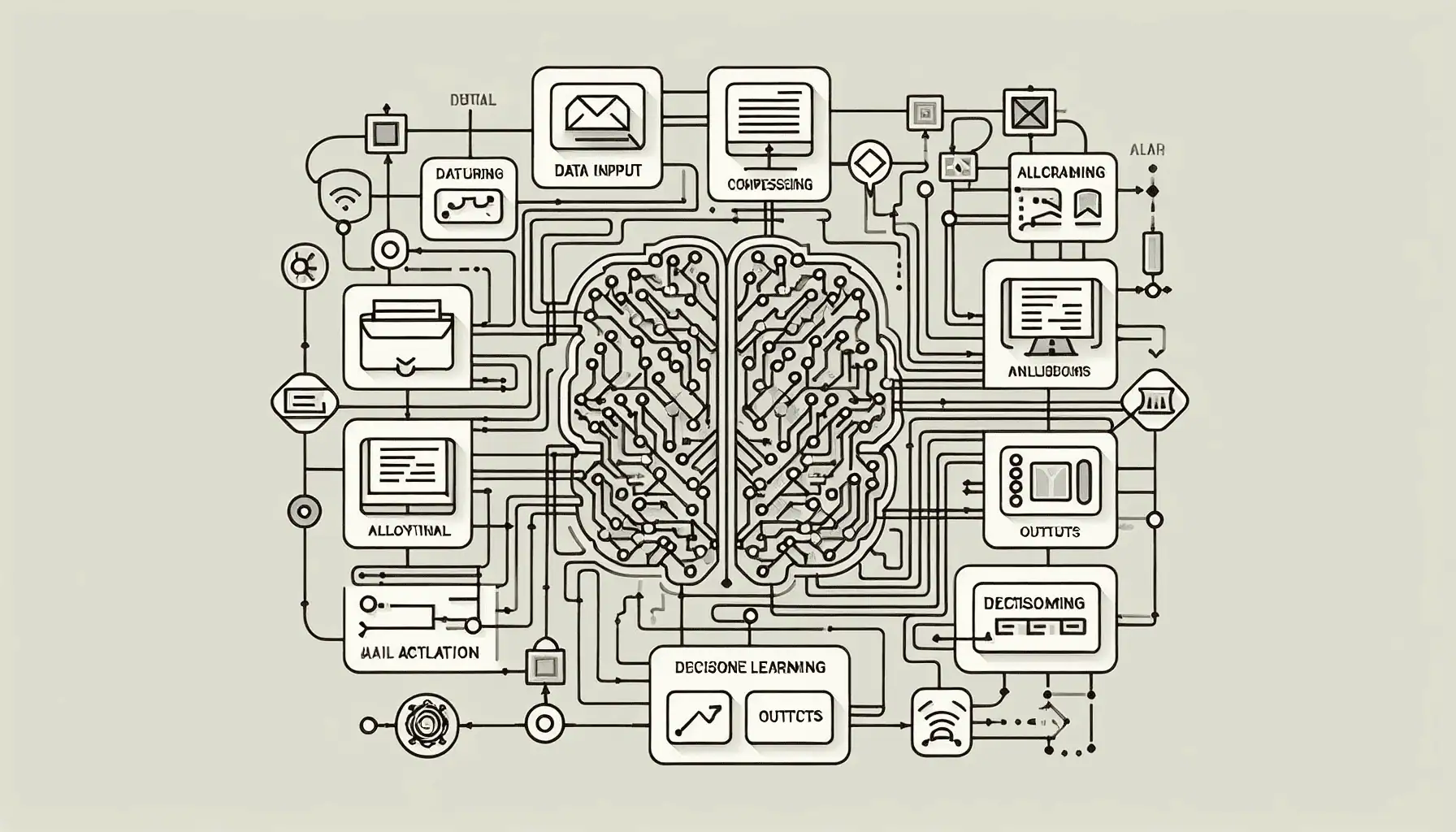
Understanding AI Agents: Future of Technology
Key Takeaways
- AI Agents Defined: Autonomous software that operates independently, capable of perception, reasoning, and action in dynamic environments.
- Broad Applications: AI agents are revolutionizing industries such as healthcare, finance, logistics, and beyond, enhancing efficiency and service delivery.
- Development Challenges: Overcoming data bias, managing ethical dilemmas, and ensuring robust security are essential for effective deployment.
- Future Insights: Emerging trends highlight greater autonomy, improved learning capabilities, and broader applications across sectors.
- Practical Implementation: Understanding different types of AI agents and their applications can maximize their potential and integration into various sectors.
Introduction
Artificial Intelligence (AI) agents have emerged as a groundbreaking force reshaping the landscape of numerous industries through their sophisticated, autonomous capabilities. These intelligent entities operate independently, executing tasks, making decisions, and adapting to rapidly changing environments. This article delves into the essence of AI agents, their transformative roles across sectors, the challenges encountered in their development, and the promising futures they herald.
Main Content
Definition of AI Agents
AI agents stand as autonomous software systems capable of functioning in complex, fluid environments without direct human intervention. Critical attributes include:
- Perception: They astutely sense and interpret environmental data, enabling real-time interaction and decision-making.
- Reasoning: Through advanced algorithms, they analyze information to formulate judgments effectively meeting predefined goals.
- Action: Based on the reasoning processes, AI agents execute actions needed to complete assigned tasks, contributing to seamless operations.
- Adaptation: They continuously learn from experiences, refining their performance and enhancing future decision-making processes.
These attributes enable AI agents to extend unprecedented innovation across various industries.
Role of AI Agents in Society
AI agents are significantly transforming diverse sectors. Consider their impact on the following:
- Healthcare: In a medical setting, AI agents enhance diagnostic accuracy and manage patient data efficiently. For example, IBM's Watson Health is assisting oncologists in identifying cancer treatment options tailored to individual genetic profiles.
- Finance: AI agents automate trading operations and enhance fraud detection. Hedge funds and banks leverage them to identify patterns and optimize trading strategies, resulting in substantial cost savings.
- Transportation: Self-driving car technology benefits immensely from these agents, managing vehicle fleets and reducing traffic congestion, demonstrated by autonomous vehicle companies like Waymo.
- Customer Service: AI agents deliver 24/7 support and personalize user interactions, with successful implementations seen in virtual assistants like Amazon's Alexa and Apple’s Siri, significantly improving customer satisfaction.
- Industry: They streamline production processes, predict maintenance needs, and minimize downtime, as witnessed in manufacturing plants employing AI-driven predictive maintenance systems.
Each application underscores AI agents' pivotal role in advancing technological capabilities and operational efficiency.
Challenges in Autonomous Agent Development
While the advantages of AI agents are vast, developing them involves overcoming notable hurdles:
Data Bias in AI Systems
Data bias presents a major challenge, leading to skewed AI decisions that perpetuate societal inequities. This includes:
- Selection Bias: Data used must be representative to ensure fairness; companies like Microsoft faced backlash with AI systems producing biased outcomes due to non-representative data sets.
- Confirmation Bias: AI models should avoid reinforcing stereotypes; training datasets need comprehensive vetting and diverse perspectives for balanced results.
- Measurement Bias: Collecting accurate data is critical, requiring consistency to support sound decision-making and avoid flawed AI outputs.
Ethical Dilemmas in Advanced AI Agents
Ethical dilemmas become pronounced as AI agents advance:
- Resource Allocation: Ensuring equitable resource distribution in healthcare, where AI could unjustly prioritize treatment options.
- Moral Decisions: Autonomous vehicles face ethical decisions during unavoidable accidents, necessitating clearly defined ethical frameworks.
- Privacy vs. Security: Balancing privacy concerns with security needs in surveillance systems remains contentious, demanding transparent policies.
Security Concerns with Autonomous Agents
Security is paramount, with potential risks such as hacking and malware affecting agent functionality. Notable incidents, like the cybersecurity breach on Tesla’s autonomous vehicle earlier in development stages, stress implementing comprehensive cybersecurity measures (SmythOS).
Advantages of Autonomous Agents
AI agents offer multidimensional advantages:
- Healthcare: They augment patient engagement and boost operational efficiency, with systems like IBM’s Watson providing personalized patient care recommendations.
- Retail: Elevating customer service and facilitating streamlined shopping experiences, as seen with retailers using AI chatbots for immediate customer interaction.
- Finance: AI agents automate routine tasks, allowing human agents to focus on complex interactions, evidenced by the deployment of Robo-advisors optimizing client portfolios.
These integrations drive improved efficiency, providing enriched customer experiences pivotal to modern business operations.
Impact of AI Agents
AI agents embody dual potential, offering significant benefits and posing certain risks:
- Benefits: They enhance customer service through instant information delivery, innovate creative content generation, and streamline various operations significantly.
- Risks: Issues like privacy invasion, job displacement, ethical challenges, and security vulnerabilities arise. For example, automated systems can replace jobs, necessitating workforce re-skilling.
Achieving a balance through robust security measures and ethical guidelines is essential for maximizing benefits while mitigating risks.
Future Trends in AI Agent Development
The future landscape of AI agents anticipates greater:
- Autonomy: Increased independence will further refine decision-making processes, as predicted by the development of agents in autonomous vehicles.
- Learning Capabilities: Enhanced learning processes will improve AI understanding and applications, fostering agents capable of complex tasks beyond routine applications.
- Transparency: Transparent AI models are critical for accountability, with algorithms providing clear interpretability, answering the demand for ethical AI operations.
- Wide Applications: Broader application potential exists across sectors; industries are gearing up for comprehensive AI integration, with a focus on promoting growth and innovation.
Autonomous Agents in Decision-Making Processes
AI agents significantly enrich decision-making processes in several ways:
- Business: They offer crucial insights aiding strategic decisions, as seen in retail analytics platforms helping to tailor strategies based on consumer behavior.
- Healthcare: Agents assist with diagnosing health conditions, improving patient care from predictive diagnostics to treatment planning.
- Customer Service: Reduced wait times and personalized support elevate customer satisfaction levels, as exemplified by AI-enhanced virtual customer service platforms.
- Finance: Identifying promising market trends supports informed investment decisions, improving financial returns and decision accuracy.
Addressing ethical and privacy concerns will ensure the successful integration of these agents into decision-making frameworks.
Types of Autonomous AI Agents
Understanding AI agents involves recognizing distinct types:
- Reactive Machines: They offer immediate responses without memory, suitable for basic, straightforward tasks.
- Limited Memory Agents: These utilize historical data, proving valuable for decision-making using past information, like AI in self-driving cars.
- Theory of Mind Agents: Expected to understand emotions and intentions, allowing for sophisticated communication, indicative of future developments.
- Self-Aware Agents: These remain hypothetical, featuring the potential for self-awareness and reflexivity, representing future AI frontier exploration.
Choosing the right agent type is critical for aligning technology with specific needs and objectives in various industries.
Utilizing AI Agents Effectively
For effective implementation and maximizing potential:
- Leverage Machine Learning: Enhance complex data analysis and promote adaptive learning tailored to evolving conditions.
- Real-World Applications: Implement innovations in healthcare, finance, retail, and entertainment; examples include AI music composition tools revolutionizing creative industries.
- Ethical Considerations: Adopting responsible usage strategies focusing on ethical practices ensures fair and secure AI agent deployment, supported by transparent AI policy frameworks.
Businesses can harness the full potential of AI agents by aligning development strategies with overarching ethical guidelines and industry-specific needs.
Conclusion
In conclusion, AI agents today represent a transformative capability across numerous fields, offering immense opportunities alongside inherent challenges. By embracing responsible practices and maintaining a strong emphasis on ethical considerations, these powerful tools are poised to bring considerable benefits to society. As technology continues to evolve, so does the potential for AI agents to drive innovation and enhance every facet of our lives, securing their place at the forefront of technological advancement.
Let AI Revolutionize Your Business
Ready to find out how AI agents and automation can transform your operations? Schedule a discovery call today and learn how our tailored solutions can save you time, boost efficiency, and help your business grow.

















